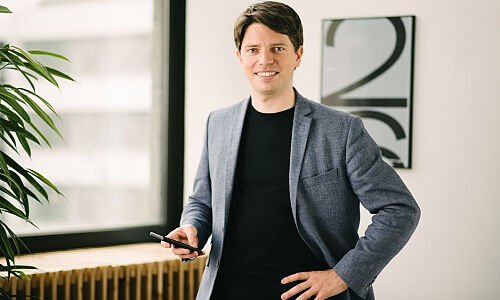What does that mean financially? Simply winning clients doesn't help you much there.
We have three main revenue streams: dealer interchange fees, our premium accounts, and other financial products like credit or savings. Of course it's important to win new clients but it's decisive for us that clients actively use N26.
We don't want them to simply try it out – we want them to use it regularly and make it their main bank in the long run. Our goal is that clients execute their entire consumption through us – that's what we can earn money on.
What do you earn from that?
We already have a very stable business model which is profitable per client. So each new client won earns us money and brings us closer to breaking even. That's dramatically different to other start-ups, where every new client just costs money first.
«We're reinvesting profits into growth»
In the short and mid-term, we reinvest the money generated from clients into product development and growing in our markets. We could of course simply lower our marketing spending and limit our expansion – we'd quickly be profitable. We're at the beginning of a journey to change banking for millions of people though. For that reason, we're investing our profits in other areas right now.
Growth before profits?
Growth is important for us: scaling effects are hugely important in digital banking today. In the old model, traditional banks frequently grew by opening new branches. Building and maintaining a branch costs between 500,000 and 1 million Swiss francs per year, or probably even more.
«Our business model is profitable, per client»
And you may only win several thousand new clients that way. Building a digital bank is considerable more expensive to start than a bank branch. But through the digital product, we can service not only several thousand but many millions of clients.
Because the marginal cost is lower?
Precisely. So we want to grow especially quickly through additional clients. Because we already know our business model is profitable per client, we're stable and robust for the long term. Mobile banks are considerably more promising for the future than physical branches.
How quickly do your backers want to get a return on their investments?
Firstly, stability fosters client trust – everyone wants their money stored in a safe place. Our business model as well as our European banking license and the associated deposit guarantees help us with that. That sets up apart from other fintechs who don't have this security yet.
«None of our investors is on board for quick profits»
Some of the best-known investors in the world have invested major sums in N26 in the last two years. These backers think in the long run and support the vision of a global bank. No one is on board for a short-term profit.
Who are your investors?
We chose them very consciously for their long-term support, for example Allianz, Tencent, Singapore's GIC, or Peter Thiel's venture fund, Valar.
We get not just financing from our investors, but expertise. We very consciously chose a series of American investors who could help us be successful faster in the U.S.
Is Tencent an indication of N26's ambitions for the Asian market?
Tencent is generally a huge player in the fintech sector. The strategic cooperation with them is more about the know-how to scale a fintech start-up efficiently worldwide, and less about an expansion into Asia.
We could imagine expanding into the region in the long run, but it isn't part of the plan we're currently pursuing.
Where is your focus now?
Europe and the U.S. We've also applied for a fintech license in Brazil.



































